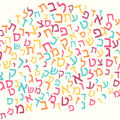 You Know More Hebrew Words Than You Think
You Know More Hebrew Words Than You Think


9 min read
How should we determine our contribution to life?
A reader writes:
I'm blessed with a loving family, teachers and friends and I have much to be thankful for. As a senior in high school about to enter the real world, I wonder how I'm going to be an asset to the Jewish people and to the world around me. I don't want to be a taker; I want to be a giver. I want to use my potential and use the talents that God gave me.
As I look back on my high school years, I only have good memories. Yet, I realized that a lot of my activities were restricted because of my stage fright, even though I don't give off the "shy girl" impression. Many times I am presented with opportunities to speak in public and I try to send someone else to speak instead of me. My shyness puzzles my family, friends, and teachers because in class, home and among my friends I am not at all shy.
As I stand at the threshold of my life about to enter the real world, I am constantly plagued with the question of what is my goal, my purpose in this world? I know I want to help people but I'm not sure how? More importantly, how will I accomplish what I have to do, with my shyness and fear of public speaking? God has blessed me with so much and I realize that everyone is judged not only for what they have done but also for what they have failed to do. I'm very sacred and confused.
The most basic human need that we all have is to matter, to make a difference. At an intuitive, gut level we know that each one of has our very own contribution to make in life.
However what may strike us as a significant and appropriate contribution might not be as impressive to the Almighty. Our evaluation of deeds and accomplishments is often based on the values of our society. Our culture applauds achievements of a public nature, those which are out there for all to see. The private deeds done in a modest manner, hidden from public view, are not appreciated in our strident world. God values inwardness, the "penimious," more than outwardness, the "chetzonious" and in determining what our contribution to life might be, we need to do a paradigm shift from that which appears as significant in a world of illusion to what realistically, by God's definition, is noteworthy.
Our sages tell us of three instances where great people misjudged and underestimated deeds they had performed.
1. Reuven -- the oldest brother of the twelve tribes of Israel, convinced his brothers not to kill their brother Joseph, but rather to throw him into a pit. As a result, the Torah records for all of history, "and Reuven heard and he saved him from their hands" (Gen.36:21). Had Reuven been able to anticipate God's positive evaluation of his deed, the medrash says that Reuven would have carried Joseph on his shoulders and returned him to his father.
2. Had Aaron, the brother of Moses, known that the verse would testify "And Aaron, your brother will see you and he will be happy in his heart" (Exodus 4:14), he would have greeted Moses, his younger brother, the newly appointed leader and redeemer of the Jewish people with drums and dancing to convey his total wholehearted support and enthusiasm. But, he did not anticipate how treasured the attribute of joy and delight in his brother's good fortune would be to God.
3. Boaz, (Ruth 2:14) who provided for Ruth's sustenance, the Moabite Convert, is acknowledged in the book of Ruth for his generous act of hospitality. Had he known, our sages tell us once again, that this would be so meaningful and so major a contribution it would merit to be recorded for all of time, he would have served Ruth pheasant-under-glass!
Our sages are telling us that it is difficult, given our flawed perspective based on what feels or appears worthwhile, to assess what will impact on our lives and the lives of those around us in a real way. Only God really knows.
How then, are we to make those really important decisions in our lives and to chart a reasonable course?
A twofold program is mapped out for us:
From a Jewish perspective the bestowal of abilities and talents mandate responsibility, that is, to serve and thereby enhance God's world.
The first commandment to Adam and Eve (Gen. 1:28) in the Garden of Eden was "be fruitful and multiply." The Zohar, the great Kabalistic work, contends that the behest to be "creative" applies not only to offspring, but to bringing to fruition the innate resources with which God has blessed us.
You, dear reader, understand the need to serve, but are concerned that your fear of public speaking will circumscribe and limit your efforts. There are many avenues toward making an impact. Public speaking is by no means the only way. While it is true that public speaking can be a great asset, a tool for providing guidance and inspiration, one-on-one communication is decidedly a more effective mode of fostering meaningful relationships and ultimately impacting on another's life. Certainly, the inability to speak publicly does not consign one to a meaningless life or one of lesser contribution. We all must find our own style, mode, and manner of expression that best fits our intended message.
Having said that, it is also true that there are times when fears of public speaking or whatever else it might be, can be overcome. It requires the willingness to be vulnerable -- to perhaps fail and then try again. It is a skill like any other -- with perseverance and the willingness to work hard these types of fears can also be mastered.
True courage is acting in spite of our fears with the comforting knowledge that everyone experiences some anxiety and nervousness, and that with practice it gets easier and better. You might also avail yourself of the many books written on the subject on public speaking available at the library.
Keep in mind that with time and effort you might come to terms with the issue of public speaking. When it comes to what your contribution ought to be, you should ideally pursue roles that will enable you first and foremost to engage the private arena, the inner sanctum where the strength of the soul is exercised through caring, loving, nurturing, sensitivity, enabling, and ennobling.
My father, of blessed memory, was the best public speaker and orator I have ever heard. His interaction with an audience, be it 10 or 10,000, was totally magical. He at once enlightened with his impressive erudition and keen insights, delighted with his humor, warmed with his sensitivity, evoked tears with his poignancy and inspired with his great passion. He had a powerful public persona and an electric presence. When he walked in, the band played and the room lit up. I recall myself as a little girl holding this magnificent person's hand and looking from side to side to make sure that everyone noticed that this man was my daddy.
Despite the glory and the great pride of being the celebrity's daughter, what warms me most in the truly dark moments of my life are the gifts he gave me in the privacy of our personal relationship -- the times I came home to New York from Milwaukee to find him looking out the window to catch the first possible glimpse of me; the occasion of my own speaking engagements when I faced his loving inspection to see if I looked good enough before I left the house; his remembering every birthday and occasions of note even though I remembered none; his pockets full of lollipops that accompanied his interaction with every grandchild; his unparalleled dedication to every member of his family, immediate and extended. Despite his colossal public achievements he was happiest when he was surrounded by all of us in the privacy of his home. His heart belonged to us.
In sifting through the maze of many options, you should apply the litmus test of what will really counts when the dust settles. Who matters to you and why? Is it someone who made it into the halls of fame and fortune, someone who made a big splash in the public arena? Or is it someone who reached out to you in a caring way and who, because of what was said or done, gave you the confidence and sense of worth to walk taller and to grow and become all that you could be?
In my humble opinion, based on extensive experience, the heroes and heroines worthy of emulation are those who, day to day, moment to moment enrich our lives. These are the mothers, bubbies, special aunts, father, zaides, teachers, and special friends -- sacred cherished members who perform on our inner stage of life. In the world of illusion they may not appear terribly glamorous, but their contribution, their imprint upon our lives is enduring and indelible.
